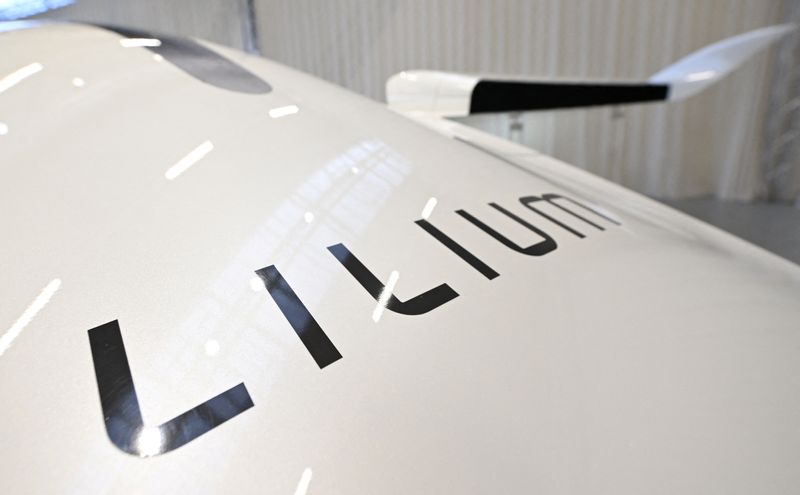By Abhijith Ganapavaram, Shivansh Tiwary
(Reuters) -The race to become the first Western air-taxi company to carry passengers lost a high-profile competitor this month when Germany's Lilium succumbed to a cash crisis, throwing a fresh spotlight on a major hurdle for the fledgling industry.
Almost halfway into the decade in which air-taxi makers have promised investors the first commercial flights, the demise of Lilium shows how dwindling cash balances threaten to delay the sector's aim to revolutionise urban travel.
Makers of electric vertical take-off and landing aircraft (eVTOL), commonly known as air taxis, have raised roughly $13 billion since 2019, but the pace of annual investments has fallen after peaking in 2021, according to data from Alton Aviation Consultancy.
Despite marquee investors such as U.S. carrier Delta Air Lines (NYSE:DAL), and automakers Stellantis (NYSE:STLA) and Toyota (NYSE:TM), analysts say billions more will be needed to achieve certification, large-scale aircraft production and profitability.
"We are starting to see the weaker players fall by the side ... there will be more to follow," said Brian Foley, founder of aviation consultancy Brian Foley Associates.
EVTOL makers have raised $2.3 billion so far in 2024, compared with $1.5 billion in 2023, $3.4 billion in 2022 and $4.3 billion a year earlier, according to Alton data, while profits have remained elusive as companies invest in setting up operations and securing certification.
The companies including Archer Aviation, Joby Aviation (NYSE:JOBY), Embraer backed-Eve Holding, Lilium and Vertical Aerospace tapped in to the blank-check firm merger craze at the beginning of the decade, going public at multibillion-dollar valuations.
That was before they even had a product - a stage where most companies prefer to stay private and depend on venture capital funding.
Archer, Joby and UK-based Vertical had estimated they would launch commercial service in 2024 after they went public, according to company statements and a 2021 Bernstein analyst note.
That timeline is certain to be missed, as regulations are still evolving in the United States and Europe. Some eVTOL companies have stopped making public predictions about approvals from the U.S. Federal Aviation Administration, which regulates the world's biggest market.
MIDDLE EAST OPPORTUNITIES
Regulatory delays, an uncertain economic environment and simmering global tensions have weighed on the sector's fundraising and progress.
"We don't have these companies getting to profitability until late into the decade," said Raymond (NS:RYMD) James analyst Savanthi Syth.
Some eVTOL makers are exploring other markets.
Archer is planning to launch commercial flights in the United Arab Emirates as early as the fourth quarter of next year, and Joby plans to launch commercial service in Dubai by early 2026.
Analysts say Middle East regulators may devote more manpower to certification and create a safe environment for eVTOLs as their rulers try to attract future technologies.
It is also easier to build infrastructure in the Middle East than in Europe and the United States, said Stephan Baur, partner at consultancy Roland Berger.
Industry experts say Archer, Eve and Joby are among the best-positioned to continue operating long enough to at least reach certification. Eve recently reached a loan agreement with Brazil's National Development Bank.
The three companies, and Vertical, are expected to burn a combined amount of least $1 billion this year, which should continue for the next two to three years, said Syth, who predicted the first eVTOL would be certified to carry passengers in late 2026 or early 2027 in the United States.
Joby burned through $863.3 million in cash between 2021 and 2023, according to LSEG data, the most among the four eVTOL makers, as its business model calls for both manufacturing and operating the aircraft.
The company, which ended the third quarter with $710 million in cash and short-term investments, has since raised $222 million through an equity offering and announced a separate agreement with Toyota, under which the automaker is expected to invest $500 million in two tranches.
Archer, which has more than $500 million in cash and cash equivalents, told Reuters it had sufficient cash for the foreseeable future.
Eve said it had raised $236 million in equity and debt since the end of the second quarter, which puts it in a "very comfortable financial position" for the next few years.
Vertical has a lower cash balance compared with the rest, though its operating model burns less cash. The company on Monday announced a tentative agreement under which debt holder Mudrick Capital Management will take part in an equity round and convert $130 million in debt to equity, which is expected to settle a default notice the investor had served to the company.
The transactions extend Vertical's cash into the fourth quarter of next year. Vertical had expressed doubts about the company as a going concern when it reported half-year results in September.
Analysts say eVTOL companies must consider production-only business models to cut their cash burn, and advances towards certification may bring in pre-delivery payments. Mergers may also be needed.
After certification, they will need to ramp up production while reducing eVTOLs' cost so they can compete with high-end taxis. Analysts say it will be crucial to keep battery and infrastructure costs under control.

Though these difficulties have led to analyst scepticism over eVTOLs dominating intra-city transport, some expressed optimism.
Last week, Needham analysts initiated coverage of Joby and Archer with "buy" ratings, saying they saw a $3 billion early stage global air taxi revenue opportunity.